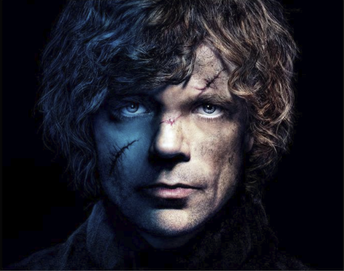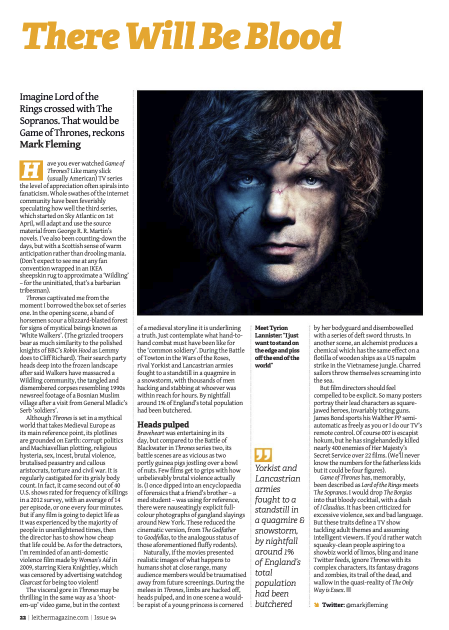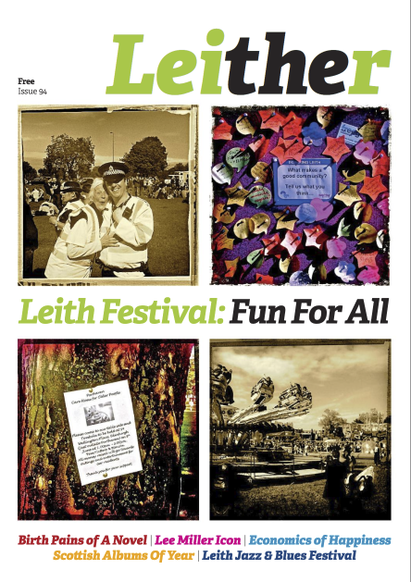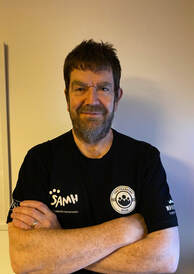Published in Issue 93 of The Leither, my article entitled 'There will be Blood' about Game of Thrones, the fabulously machiavellian fantasy series, definitely not for the squeamish.Have you ever watched Game of Thrones? Like many of these slick (usually American) TV series, the level of appreciation often spirals into fanaticism. Whole swathes of the internet community have been feverishly speculating how well the imminent Series Three (released on Sky Atlantic on April 1) will adapt George R R Martin’s source novels. I’ve also been counting-down the days, but with a Scottish sense of warm anticipation rather than drooling mania. (Don’t expect to see me at any fan convention wrapped in an IKEA sheepskin rug to approximate a ‘Wildling’ - for the uninitiated, that’s a barbarian tribesman). Thrones captivated me from the moment I borrowed the box-set of Series One. In the opening scene, a band of horsemen scour a blizzard-blasted forest for signs of mystical beings known as ‘White Walkers’. (The grizzled troopers bear as much similarity to the polished knights of BBC’s Robin Hood as Lemmy does Cliff Richard). Their search party heads deep into the frozen landscape after said Walkers have massacred a Wildling community, the tangled and dismembered corpses resembling 1990s newsreel footage of a Bosnian Muslim village after a visit from General Mladic’s Serb ‘soldiers’. Although Thrones is set in a mythical world that takes Medieval Europe as its main reference point, its plotlines are grounded on Earth: corrupt politics and Machiavellian plotting, religious hysteria, sex, incest, brutal violence, brutalised peasantry and callous aristocrats, torture and civil war. It is regularly castigated for its grisly body count. In fact, it came second out of 40 U.S. shows rated for frequency of killings in a 2012 survey, with an average of 14 per episode, or one every four minutes. But if any film is going to depict life as it was experienced by the majority of people in unenlightened times, then the director has to show how cheap that life could be. As for the detractors, I’m reminded of an anti-domestic violence film made by Woman’s Aid in 2009, starring Keira Knightley, which was censored by advertising watchdog Clearcast for being too violent! The gore may be thrilling in the same way as a ‘shoot-em-up’ video game, but it is underlining a truth. Just contemplate what hand-to-hand combat must have been like for the ‘common soldiery’. During the Battle of Towton in the Wars of the Roses, rival Yorkist and Lancastrian armies fought to a standstill in a quagmire in a snowstorm. By nightfall around 1% of England’s total population had been butchered. The visceral gore in Thrones may be thrilling in the same way as a ‘shoot-em-up’ video game, but in the context of a medieval storyline it is underlining a truth. Just contemplate what hand-to-hand combat must have been like for the ‘common soldiery’. During the Battle of Towton in the Wars of the Roses, rival Yorkist and Lancastrian armies fought to a standstill in a quagmire in a snowstorm, with thousands of men hacking and stabbing at whoever was within reach for hours. By nightfall around 1% of England’s total population had been butchered. Braveheart was entertaining in its day, but compared to the Battle of Blackwater in Thrones Series Two, its battle scenes are as vicious as two portly guinea pigs jostling over a bowl of nuts. Few films get to grips with how unbelievably brutal violence actually is. (I once dipped into an encyclopaedia of forensics that a friend’s brother – a med student - was using for reference. There were nauseatingly explicit full-colour photographs of gangland slayings around New York. These reduced the cinematic version, from The Godfather to Goodfellas, to the analogous status of those aforementioned fluffy rodents). If the movies presented realistic images of what happens to humans shot at close range, many audience members would be traumatised away from future screenings. During the melees in Thrones, limbs are hacked off, heads pulped, and in one scene a would-be rapist of a young princess is cornered by her bodyguard, then disembowelled with a series of deft sword thrusts. In another scene, an alchemist produces a chemical which has the same effect on a flotilla of wooden ships as a US napalm strike in the Vietnamese jungle. Charred sailors throw themselves screaming into the sea. But film directors should feel compelled to be explicit. So many posters portray their lead characters as square-jawed heroes, invariably toting guns. James Bond sports his Walther PP semi-automatic as freely as you or I do our TV's remote control. Of course, 007 is escapist hokum, but he has single-handedly killed nearly 400 enemies of Her Majesty's Secret Service over 22 films. (We’ll never know the numbers for the fatherless kids but it could be four figures). Thrones has memorably been described as Lord of the Rings meets The Sopranos. I would drop The Borgias into that bloody cocktail, with a dash of I, Claudius. It has been criticized for excessive violence, sex and bad language. But these traits define a TV show tackling adult themes and assuming intelligent viewers. If you’d rather watch squeaky-clean people aspiring to a showbiz world of limos, bling and inane Twitter feeds, ignore Thrones with its complex characters, its fantasy dragons and zombies, its trail of dead, and wallow in the vapid reality of The Only Way is Essex. Comments are closed.
|
|




 RSS Feed
RSS Feed
